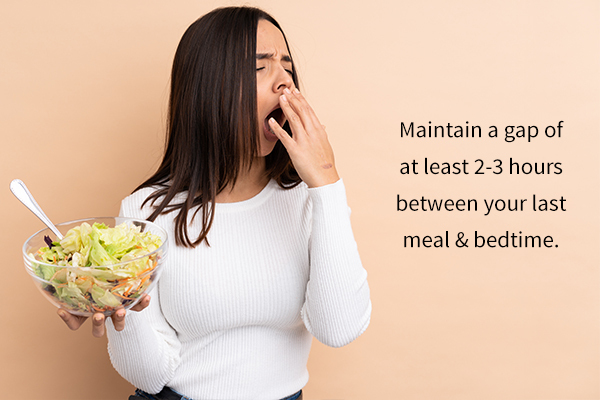In this article:
Gastroesophageal reflux disease (GERD) is a long-term digestive disorder characterized by the frequent backflow of acidic stomach contents into the esophagus, a hollow tube that connects the throat to the stomach.

GERD is a chronic form of acid reflux that causes a burning sensation in the chest, pain, and in some cases, nausea and a bitter taste in the mouth. However, the symptoms of GERD can be easily managed through dietary and lifestyle changes.
Physiology of GERD: How It Occurs
The bottom of the esophagus where it meets the stomach is affixed with a circular, muscular ring known as the lower esophageal sphincter (LES).
The LES serves as a valve between the esophagus and the stomach. It remains tightly shut at all times, except to allow the passage of swallowed food into the stomach.
GERD occurs when the sphincter muscles become weak or are unable to close properly. This malfunction allows the reflux of stomach acids and digestive juices from the stomach into the esophagus. This repetitive acid reflux can cause irritation or inflammation of the esophageal tissue.
GERD is unlikely to cause any visible damage to the esophagus (no ulcers or precancerous lesions). Still, it can be a constant discomfort that can severely hamper your day-to-day life. Nearly 20% of all adults suffer from acid reflux on almost a weekly basis. (1)
Medical Treatment for GERD
GERD is not a disease that specific treatment will cure it. GERD can be controlled but not cured.
- Symptomatic treatment of GERD involves the use of over-the-counter medications such as TUMS, Pepcid, Zantac (recalled now due to contamination with a potential carcinogen), and Prilosec.
- Acid reduction therapies (H2 blockers (H2Bs) or proton pump inhibitors (PPIs)) can be considered for long-term relief. A trial of 2 weeks with H2Bs or PPIs is sufficient to control symptoms in most patients.
- Some may need a longer duration of treatment if symptoms recur/persist or occur with other conditions (hiatal hernia, (2) obesity, (3) delayed gastric emptying, esophageal motility disorders, decreased salivary secretion, etc.) that may continue to worsen acid reflux or its symptoms.
- Anti-reflux surgeries may help. However, the landmark study LOTUS trial found that there is no difference in the overall outcomes in patients who took PPIs versus patients who underwent anti-reflux surgery at the end of 5 years. (4)
Therefore, the role of therapies is only to minimize acid reflux and help heal any erosive damages in the esophagus, thereby decreasing the symptoms and improving the overall quality of life.
Controlling long-term GERD is important as unchecked GERD increases the risk of strictures (narrowing) in the esophagus, Barrett’s (precancerous condition) esophagus, and esophageal cancer.
Another concern is the decreased quality of life with constant symptoms. Prompt referral to a specialist is recommended if any alarming symptoms (swallowing difficulty, weight loss, gastrointestinal bleeding) are noted.
Also, it is important to understand that not all heartburn is from GERD. Several functional gastrointestinal disorders exhibit symptoms that are similar to GERD. Thus, it is imperative to consult a doctor for a reliable diagnosis.
ALSO READ: Acid Reflux and GERD: Causes, Symptoms, and Treatment
Dietary Recommendations for Managing GERD

The following dietary tips can help in the management of GERD symptoms:
- Minimize the intake of acidic foods, although no scientific data are available to support that such foods actually cause increased reflux.
- Eat low-fat, fist-sized meals at regular intervals. This may be especially helpful if you are diagnosed with gastroparesis and suffer from gastric emptying issues.
- Exercise strict glucose control if you have diabetes.
- Avoid fatty foods as they can cause delayed gastric emptying.
- Ginger has been studied and is known to reduce GERD symptoms as it helps digest food and stimulate other digestive enzymes. (5)
- Peppermint may seem to help by improving the symptoms of irritable bowel syndrome (IBS), which may co-exist with GERD.
- Delay going to bed for at least 2–3 hours after having your last meal or snack of the day.
- Regularize your daily meal patterns.
- Avoid frequent snacking as it can stimulate gastric acid secretion and, thereby, reflux-related symptoms in patients with GERD.
- Limit your consumption of cheese, wine, and decaffeinated drinks.
Preventive Measures for GERD Symptoms
Here are some self-care measures that may help reduce the incidence and severity of GERD symptoms:
- Sleep with your head in a raised position to help keep your food down through the simple force of gravity. To that end, you can either prop a few extra pillows under your head or elevate the head end of your bed by a 20°–30° angle.
- Follow an anti-reflux diet, which is designed following the Gastroesophageal Reflux Disease Handout.
- Avoid eating within 4 hours and drinking, even water, within 2 hours of lying down.
- Do not rush through your meals. Take small bites and chew them well, instead of gulping them down.
- If you have a high BMI (above 25) and abdominal obesity, you are recommended to lose at least 5%–7% of your body weight. (6)
- Avoid foods high in fermentable carbohydrates (high FODMAPs) to help with bloating symptoms, especially if you have co-existing functional abdominal disorders.
Can Probiotics Help in the Treatment of GERD?

Probiotics have been widely recommended for various gastrointestinal issues by several health entities.
To date, no data from a good-quality randomized trial exist to support their effectiveness directly in the case of GERD. Their perceived effectiveness could be from the placebo effect; in reality, they do not alter acid reflux.
The unchecked use of probiotics in the community may be due to their almost negligible side effect profile.
Final Word
GERD is a severe form of acid reflux wherein the stomach contents, especially stomach acid, travel up the esophagus and cause irritation. It can occur in people of all ages.
While acid reflux is normal, GERD can cause a great deal of discomfort. If left untreated, GERD can also lead to various complications. Therefore, it is best to consult a doctor for proper diagnosis and treatment.
- Was this article helpful?
- YES, THANKS!NOT REALLY


